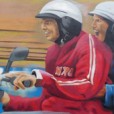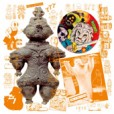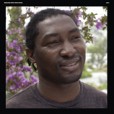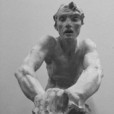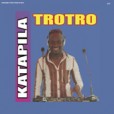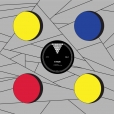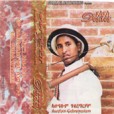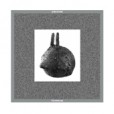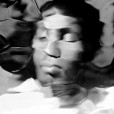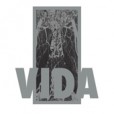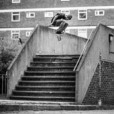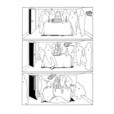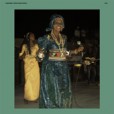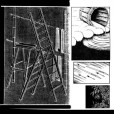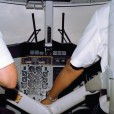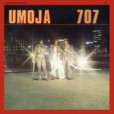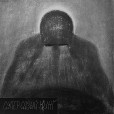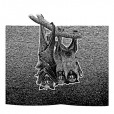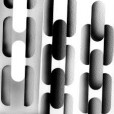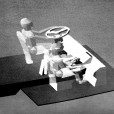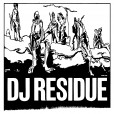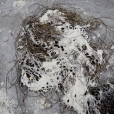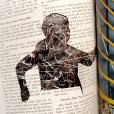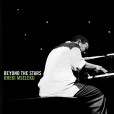Your basket is empty

‘Recorded across East London, South-East Kent and Snaresbrook Crown Court during what is described as “the UK media’s attempt at divining integrity from the orchestrated turbulence of Brexit”, with the record setting out to “juggle the documentation of this particular moment with the desire to discern motivation from despair”. World In Action takes in field recordings, woodwind freakouts and percussion from Valentina Magaletti amongst other elements’ (The Quietus).
D.K. and Low Jack.
‘SK Kakraba is a master of the gyil xylophone — fourteen wooden slats strung across calabash resonators. The silk walls of spiders’ egg sacs — ‘paapieye’ in the Lobi language — are stretched across holes in the gourds, giving each note a buzzy rattle. SK learned as a child from elders in his Lobi community in the far northwest reaches of Ghana.’
Beautiful, spare, mesmeric recordings — song cycles, dirges, improvisations based on traditional songs, original compositions — newly made.
Utterly infectious, bubbling, spare, playful house music from Ghana, steeped in neo-traditional idioms like gome and kpanlogo, as much as vintage Chicago acid and UK rave, highlife and hiplife, soca and dancehall. (As well as Accra pop radio stars like Crystal Waters, Inner Life and Rick Astley.) Over bass-heavy, percussive rhythms, Trotro sings, chants and raps in Twi and Ga, often like no one is listening. It’s impossible not to answer back.
Terrific, refreshing stuff.
Eight charged, intimate meditations by Julie Normal and Olivier Demeaux, playing a rickety ondes Martenot and an old church harmonium.
Gripping, detailed, stately improvisation — a bit like the ùrlars in classical bagpipe music — which nervily mixes the sternly doom-laden with precarious, other-worldly wonderment.
(The ondes Martenot is an amazing twentieth-century instrument — beloved by Messiaen, for example, and Varese. The theme-song of Star Trek is a vocal forgery of its sound. ‘J’aime cette fragilité qui côtoie la capacité de te décoller le tympan sur certaines fréquences inopinément,’ says Julie. ‘Je tiens une bombe dans les mains. J’aime son instabilité, son humanité.’)
Wood, breath, blood, eggshells… on the night of a purple moon.
Very warmly recommended.
Samo lived in Hong Kong for a bit. He rescued a dog and brought him back to Stockholm. He skates but that’s not him on the front. He put together one of the best very records on LIES but this four-tracker kills it dead. Ben UFO’s been rinsing it. The dog’s name is Denzil.
None other than Blawan on his lonesome ownsome — after collaborations with Pariah as Karenn, and Surgeon as Trade — returning to the blood-drenched scene of his heinous Why They Hide Their Bodies.
New name, new sound; heavier and slower than his Ternesc output. The title track is the banger. Acid techno — deliberate, widescreen and ominous.
Lovely, hypnotic, rocking peulh music from Dilly commune, Mali, near the border with Mauritania (and the same family grouping as the celebrated singer Inna Baba Coulibaly). Duelling ngonis, calabash, flute, dashes of electric guitar; newly recorded.
A cosmic, percussive jam and bitter-sweet electroid house — both veering sharply into dark, steely, dubwise self-harm. Allegedly the fiftieth utterance of our favourite dance music label in the world. Hats off! More worries!
You can’t make sense of this, clicking through mp3s, on tin-pan computer speakers. Put the record on, though, and set the controls for the heart of the bloke next door, and it’s terrific. The drum-less, throbbing, droning, wailing, sawing, twinkling reconnaissance of Nothing, with massive, unnerving swoops, throttling and surges.
Beatrice Dillon and Kassem Mosse.
Great photos by Anne Tetzlaff on the sleeve.
DJ Nobu & NHK yx Koyxen.
Kassem Mosse worries.
Snoopy is hard to follow up. The same brilliant musicality is lavished on Orange — a combination of unmistakably original, skittering drum programming, startlingly fresh instrumental interjections, creepily invocatory voices, and dubwise treatments — giddily imbued with the dark arts of ritual and seance. But Orange is more gripping, focussed and urgent, more intense and ambitious. Next level.
Its first quarter presents a trio of forays in suspense.
Bassline squares up like an epic psych-funk grinder, with a moody guitar line traversed by ticking drum patterns and faint electric crackle. In no time the guitar is staggering and stammering under the duress of echo and distortion, and over-run with percussive electronics and the first of the voices massing in the music’s head. The mood has quickly become more trepidatious. We’re deeper underground; it’s gloomier, wetter.
Shred propulsively ratchets up the tension and menace. Glazily tentative xylophone is played against slashing, nervy cello. The voices are more strangulated and sick now. Flutes and chimes evoke the same kind of beautiful, contaminated efflorescence which is pictured on the LP’s front cover.
Voice Of The Spider makes easier progress across this cavernous, shadowy, dripping terrain, with funky pads and Nasty, eighties, No Wave electric bass; woozy chimes, non-plussed keys, singing-in-tongues.
Pink Mist marks an arrival, or unbottling, with annunciatory church-organ and choral voices from the off, and a newly relaxed, head-nodding kosmische rhythm.
Mandarin is a short, beat-less and voice-free interlude for piano and bass. It’s reflective and nostalgic, ambivalent and inconclusive, with a lovely snatch of melody. A bridge half-way.
Would You Like A Vampire is a triumphant, mesmerizing go at New Folk, with strummed acoustic guitar, descant song, and jazzily restless drum programming (including a tasty bass-bin trembler). Amazingly, Conrad Standish is joined at the mic by none other than Bridget St John. Together they sing ‘Earth is Paradise’ so repeatedly and tremulously — and the song is cut off so abruptly at the end — it seems as if the verb is teetering on the past tense, and hymn fading into valediction and catastrophe.
In the same line of thought, Storm Rips Banana Tree begins idyllically enough, with a CS-&-Kreme-style raga… before something like an immense, obliterative drill starts up. Harpsichord and organ — by James Rushford — and flutes, and clapping, distant chanting and insectile percussion steadily leaven the dread, till finally all that is left is lapping water.
It’s an epic, deeply immersive, compelling, thought-provoking, twenty-minute finale… the coup de grâce.
An electrifying, previously unreleased studio album, recorded in 2003, this stunning solo piano suite condenses Mseleku’s visionary overstanding of South African music into a flowing, pulsing statement in six parts. With jazzwise echoes of marabi, amahubo, maskanda and Nguni song forms binding it to the deep music of Mseleku’s Zulu heritage, Beyond The Stars provides what Blue Note recording artist Nduduzo Makhathini describes in his liner notes as ‘a divine summary’ of Bheki’s life story: ‘a sonic pilgrimage from the beautiful and organic landscapes of Durban, to the vibrant energy of London and ultimately toward the inner dimensions of one’s being.’
A magnificent start by new label Tapestry Works.

